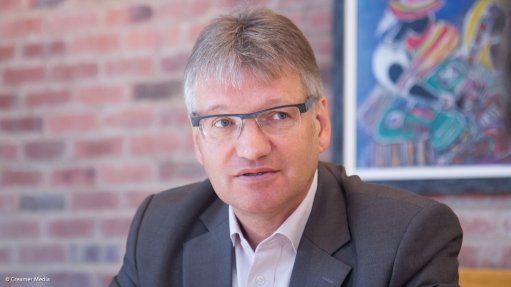
Photo by: Duane Daws
Gibela has three main challenges in executing the R51-billion contract to supply the Passenger Rail Agency of South Africa (PRASA) with 600 new trains, says CEO Marc Granger.
The first is to complete the design engineering of the X’Trapolis MEtric GAuge (Mega) units Gibela will supply to PRASA’s Metrorail service.
The first 20 trains will be built in Brazil and shipped to South Africa by the end of 2015.
This challenge can be overcome relatively easily, says Granger.
The second challenge is to start up the factory to produce the remaining 580 trains. Construction at the East Rand site must start in February next year.
Gibela, PRASA and the Ekurhuleni munici-pality must all work together to create the 70 ha industrial park where the trains will be assembled.
The third challenge has two parts, adds Granger.
Once the Dunnottar facility is available, Gibela will need staff to build the trains.
This means Gibela has 18 to 24 months to find and train 1 500 people to build the required rolling stock.
Granger wants the Brazilian assembly project to serve as a training programme for Gibela’s South African employees.
The second part of the third challenge is to secure the parts and raw materials required for the trains from a local rolling stock supply chain, which does not, for the most part, exist yet.
“This is perhaps the most critical challenge,” says Granger.
Gibela, with lead partner Alstom Transport, will be responsible for a significant part of this supply chain, as part of its black economic-empowerment (BEE) commitments.
“Everyone will have to understand what we need, and how they must change and who they must recruit to deliver on these needs,” explains Granger.
He is positive that Gibela can deliver on its contractual commitments, as well as on PRASA’s long-term goal of revitalising the South African rail industry.
“We will do it. We have done these localisation processes before and we know how to do it. And we have the backup of Alstom Transport.”
R30bn to Black Business
Gibela aims to source R30-billion in business from black enterprises over the life span of the contract, up to 2035.
Granger says Gibela has commtited to localising 70% of the contract value, with preference given to black-owned businesses.
In order to achieve this, the group has com-pleted a detailed analysis of the rolling stock it intends to introduce to see which parts can be sourced in South Africa.
Several companies will have to be developed and nurtured to achieve the quantity and quality demands set by Gibela.
One example is Siyahamba Engineering, which already produces coach parts for the local industry.
Gibela would like to source its driver cab doors from the 90% black-owned company, but Siyahamba would need to expand and upgrade to deliver the number of doors and the quality of the doors required.
In the end, Siyahamba would probably double in size.
“It is important to remember that this is a long, 20-year journey. Everything will not happen on day one,” says Granger.
The second leg of the contract’s BEE targets is shareholding.
Alstom Transport is the main shareholder in Gibela.
PRASA issued a tender inviting entities to participate as shareholders in Gibela, with more than 100 companies participating in the process.
PRASA made its decision in 2013, with Ubumbano holding 17% of the 39% shareholding reserved in Gibela for BEE partners.